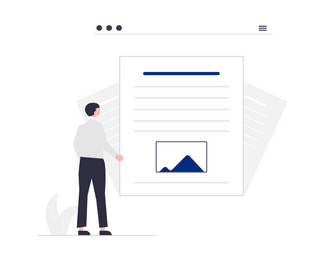Exciting developments are happening in the legal industry. And these changes are requiring a new breed of litigation support service providers that can adequately support today’s modern law firm and corporate legal department. Read on to learn:
- How the litigation support service provider industry is changing
- How this is impacting law firms
- What law firms should look for and avoid
- And how law firms can best leverage a strategic partner in litigation support services to gain maximum value; especially those law firms that are particularly keen to modernize or run their firm more like a business, which we see happening more and more every day.
How the Litigation Support Service Industry is Changing
Innovation, disruption, and digital transformation have now fully penetrated the legal industry – from the courts to the law firms down to the vendors + suppliers. If we can find a silver lining in the Covid-19 pandemic, it would be the acceleration of these trends that are serving to modernize the industry.
As a result of this digital transformation, an explosion of customer and business data is being created and used for metrics, reporting, and insights. And more and more law firms are leveraging this data to improve their competitive advantage and the business side of law.
Case Study:
Courts are implementing various digital technologies to automate processes and increase access to justice. eFiling couldn’t have arrived soon enough during these times. Courts that already had implemented it were able to return to court operations and productivity while others who hadn’t struggled to cope.
Quick Fact: Prior to the pandemic, approximately 20 county courts had implemented eFiling. As of summer, 2022, that number stands at 30, with an additional 6 county courts on the way during 2023. With a total of 36 counties implementing eFiling, that will mean almost 60% of the state’s 58 county courts will be eFiling.
Law firms too have increased their adoption of technology as they seek to comply with changing court rules, modernize their practices and/or prepare for the future needs of their firms. Indeed, law firms are realizing the value of system integrations, process automation, data and analytics to improve their business of law.
Because the demand for legal tech is increasing, legal tech vendors with the right software and hardware are cropping up ready to support the technological needs of the legal industry.
Ready to quick-start your law firm’s digital transformation initiative?
Read How to Map Out Your Law Firm’s Digital Transformation and learn the step-by-step process to make it happen.
Bottomline: The litigation support service industry is changing due to the dynamics of the legal market changing.
And speaking of this change; as law firms engage in digital transformations and modernize their business practices, this is requiring a new breed of litigation support service providers that can adequately support today’s modern law firm.
And what we see is that innovative thinking and technology are bifurcating the litigation support service provider landscape into one that is distinguishing between strategic partners and transactional vendors, also known as, traditional attorney service firms.
Want the eBook version of this article?
| Innovative thinking and technology |  | Distinguishing strategic partners from transactional vendors |

For law firms to reap the strategic advantages litigation support service providers can offer them, they must be able to discern and select a strategic partner. The differences that legitimately separate strategic partners from the field of transactional vendors may not be readily apparent on the surface.
What’s the Difference?
| Transactional Vendors | |
| Value Creation Goal: | Order-based and narrow organizational focus |
| Timeframe: | Short to medium term (1-3 years) |
| Stakeholder Relationships: | Impersonal, executed through contracts; can be treated as fungible and expendable |
| Value Creation Approach: | Make unilateral moves, using financial or legal power to reward or punish |
| Strategic Partners | |
| Value Creation Goal: | Goal-based, cross-functional organization |
| Timeframe: | Short, medium AND long term |
| Stakeholder Relationships: | Relational, trust-based, treated as valuable, non-fungible assets to be grown and sustained |
| Value Creation Approach: | Achieve goals through collaboration, relying on power to influence and create shared purpose |
Traditional, transactional vendors focus on tactical items such as orders or transactions and they typically work with a narrow slice of an organization, perhaps with a single paralegal or legal secretary. They’re focused on getting the work done; they follow a simple formula, i.e., 1+1 = 2.
Strategic partners on the other hand, inquire about, and focus on your firm’s strategic goals. Improve process efficiencies, reduce costs, better manage risk and more – they are more focused on how to deliver greater business value and strategic outcomes. For them, they are looking at how to make 1+1 = 4.
Features of a Strategic Litigation Support Service Provider
✓ Expertise: They offer deep experience with California court rules, nationwide process serving requirements and legal technology so they can provide more reliable and timely delivery of legal documents. Their decades of experience allow them to deliver efficiency and productivity insights to their customers.
✓ Performance: They’ve designed their services and software to maximize the speed and accuracy of filing and serving legal documents to quickly deliver Conformed Copies and Proofs of Service to clients.
✓ Accountability: They make it clear how their business impacts your business by transparently showing customers their performance:
-
- eFiling Turnaround Times
- Serve Success Rates
- User Behavior and Order Data
✓ Partnership: They focus on long-term client success by continually earning client trust in every interaction. Every order is important to them. Nothing’s worse than a vendor who works so hard to win you over, only to abandon you thereafter because they’re more focused on acquiring customers than keeping them.

While they want to ensure they are properly executing the procedural elements of the law, or practice of law, they are equally keenly concentrated on the business of law, too.
✓ eFiling Footprint and Tech: They should be a certified eFiling Service Provider for all courts in California. They should leverage advanced, file + serve technology that is integrated with these courts. In fact, they may even be one of the first eFiling service providers to become certified in the state.
✓ Cultural DNA: Their mindset and culture are always forward-thinking and challenging the status quo. Always pushing to be faster and better by blending their expertise with legal technology to deliver greater value to their customers.
✓ Data-driven Insights for Business Intelligence: They provide data and insights into file and serve performance and user productivity through metrics/reporting for legal operations business intelligence.
✓ Forward-thinking Expertise for Legal Workflow Automation: They can, and welcome the opportunity, to integrate their systems such as Customer Relationship Management (CRM) with a client’s CRM and/or Practice Management Software for streamlined accounting of client’s end-customer costs and more accurate invoice tracking for better cost visibility and control.

How This is Impacting Law Firms
Law firms are reaping the benefits of litigation support service providers that act as their strategic partner. They are realizing greater efficiencies by getting their work done quickly and accurately. They are also seeing increases in productivity by unlocking staff time, which allows staff to focus on other important tasks
Strategic partners are allowing law firms to have more transparency with how their provider is performing by reviewing performance metrics or setting up quarterly business reviews to discuss performance and the current state of the partnership.
By using the strategic partner model the partners, themselves, are being more accountable when issues come up. Likewise, firms can mitigate risk by ensuring the software used with their strategic partner is built with professional grade security, compliance, and integrity.
Law firms are also realizing cost-savings by reducing staff time on both order placement and status update retrieval. Additionally, they are eliminating errors by offering more communication channels to answer questions, or opportunities for further staff training. Partners are also offering volume discounts and intuitive, transparent pricing to diminish cost as much as possible.
What Law Firms Should Look For
A strategic litigation support service partner does more for your business than simply delivering a service. You should think of litigation support service providers as strategic partners instead of merely “providers” for the following reasons:
- They offer a complete solution by leveraging their expertise, experience, technology, and customer support resources to meet your needs
- They are proactive with you and seek to add value to your firm.
- They inquire about your firm’s goals and objectives to understand their role and fit in helping you achieve them.
- They focus on strategic business outcomes such as cost and process efficiencies as well as risk management.
- They are always thinking of new and different ways to do things.
- They care about each interaction with you because their focus is a long-term relationship and partnership with your firm.
- They provide data and reports to you for transparency and accountability, plus much more

What Law Firms Should Avoid
- A transactional litigation support service vendor simply sells you a service or product.
- They tend to be reactive to your needs.
- They tend to think and act tactically by focusing on the what, not the why, focusing on the now, not the future, focusing on the status quo, not innovation.
They will typically take care of your firm’s basic needs, but they will not have the capability nor mindset to solve new problems or seize new opportunities for your firm.
Wondering if it might be time to switch your
legal support service provider? Read:
5 Signs It’s Time to Switch Your Legal Support Service Provider
Case Studies: How Law Firms Can Best Leverage a Strategic Partner in Litigation Support Services
Now that you have a clearer understanding about the benefits of working with a strategic partner in litigation support services, here are three real-life case studies/use cases of how firms are leveraging those partnerships.

1. California-based law firm leverages CRM-to CRM integration
The first example involves a firm that was being inundated with hundreds of invoices, which made it difficult for them to define cost. They weren’t sure whether all their costs were even being recovered during the fee motion process. Because the firm and its litigation support service provider used the same system for storing information and invoices, they were able to fully integrate the two systems.
As a result, when the firm’s fee motion department is ready to gather costs, with a click of a button they have all the necessary information already detailed and calculated in their own system. The upshot is that the firm no longer worries about missing out on recoverable fees.
2. Northern California law firm integrates accounting system with its litigation support service provider
The second example is a Bay Area firm that was having trouble allocating expenses to specific client transactions. The firm would receive a credit card statement with large transaction amounts, leaving staff members to figure out which clients to bill, and how many different clients were included in that transaction.
The litigation support service provider was able to customize an invoicing process tailored to address this issue. Now, just a quick search allows the firm to define, and attribute spend to specific clients. This customization has become a great time saver for the firm.
3. Law firms looking at how to leverage e-Filing API
The third example involves large law firms in the debt collection space that file hundreds of complaints in bulk daily. The volume of these complaints has driven the firms to find a way to avoid the lengthy order process altogether. As a solution, the litigation support service provider that works with these firms is leveraging technology to integrate with the firms’ practice management software so orders may be completed more quickly.
This integration will enable the firms to place orders directly through their system with a click of the mouse. It will eliminate the need for a standalone portal and ultimately allow the firm’s staff member to manage work from inside a singular system; to which the firm is already accustomed.
You Deserve a Strategic Partner in Litigation Support Services
The litigation support service industry is changing. With those changes comes the option to work with a transactional vendor or a strategic partner who will help your law firm adjust to the industry. It’s an important decision to consider because today’s best of breed litigation support service providers act as a strategic partner to their clients; delivering real business value and competitive advantages to law firms.
Why settle for a traditional service provider who will give you nothing more than the status quo when you can leverage the vast expertise, experience, technology, and customer support resources of a strategic partner?
It’s time to make your move.
A consultation with a Rapid Legal account executive will change the way you look at litigation support service providers and open the door to exceptional performance.
There’s no reason to wait. Book a demo or schedule a call now.
